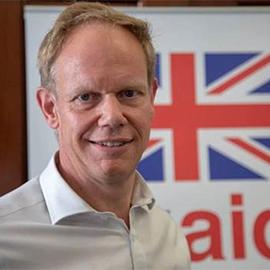GovTech: Putting People First with Simple, Efficient and Transparent Government

GovTech: Putting People First with Simple, Efficient and Transparent Government
Rapid technological change and growing expectations of citizens are elevating the importance of digital innovation for governments around the world. The World Bank Group, working together with other stakeholders, has a role to play in ensuring client countries have access to knowledge, the solutions, and the expertise required to bring about digital transformation of government services.
The event began with a fireside chat with Ceyla Pazarbasioglu, Vice President of Equitable Growth, Finance and Institutions at the World Bank Group, and Daniel Korski, CBE, CEO of Public.
Daniel Korski discussed how technology is creating a moment where innovation can finally begin to influence how public services are delivered.
“Technology can track the delivery of goods, services, and outcomes in a way that we've never been able to achieve before,” said Daniel Korski.![]() “The more that we move towards an open, transparent system, the easier it will be for us to pinpoint where corruption is happening or where something isn't working.”
“The more that we move towards an open, transparent system, the easier it will be for us to pinpoint where corruption is happening or where something isn't working.”
The fireside chat was followed by an expert panel discussion with voices from technology innovators, policy makers, and development partners.
“There is a great risk of reinforcing existing divides and creating new ones as we move further into the digital era,” said Matthew Rycroft, CBE, Permanent Secretary, Department for International Development, UK.![]() “We must use the digital revolution to help those who are most at risk of being left behind -- including women, girls and the disabled -- catch up. Ultimately GovTech isn't an end in itself.
“We must use the digital revolution to help those who are most at risk of being left behind -- including women, girls and the disabled -- catch up. Ultimately GovTech isn't an end in itself.
Yasodara Córdova, Senior Fellow, Data & Misinformation at the Digital Harvard Kennedy School, stated that citizen engagement is vital to ensuring GovTech services are democratic.![]() Offline grassroots institutions, like steering committees and popular associations, are key to make GovTech work for all.
Offline grassroots institutions, like steering committees and popular associations, are key to make GovTech work for all.![]()
“Austria started going digital in certain areas of its service delivery many years ago,” said Harald Waiglein, Director General for Economic Policy, Financial Markets and Customs Duties, Austria.![]() “The push now is about simplifying things for clients.”
“The push now is about simplifying things for clients.”
“E-government is very important to us because we are trying to implement the fourth industrial revolution and reduce the poverty level,” said Minister Mai Tien Dung![]() . He said that Vietnam does not want to leave any citizens behind during this process which is the point of GovTech, especially for the people in developing countries.
. He said that Vietnam does not want to leave any citizens behind during this process which is the point of GovTech, especially for the people in developing countries.
“Many of the key components of cloud and open data, if properly implemented, can provide governments with a leap forward,” said Peter Selfridge, Global Head of Digital Government at SAP![]() , discussing how technology is creating a moment where innovation can finally begin to influence how public services are delivered concerns governments might have.
, discussing how technology is creating a moment where innovation can finally begin to influence how public services are delivered concerns governments might have.
Partnerships, participation, privacy, digital ecosystems, climate change, accountability -- these were some of the issues raised by the panel when asked to share their final thoughts on the discussion.
If you missed the event, replay the video and tell us what you think in the comments or by using the #GovTech hashtag on Twitter.

![[Backup] WBLive_landscape_All-colors - 1](https://s7d1.scene7.com/is/image/wbcollab/trending-World-Bank-Live-landscape?qlt=75&resMode=sharp2)







